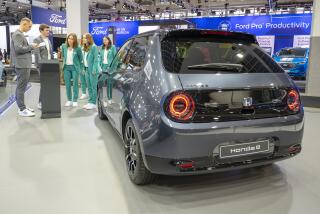Toyota reveals exterior, Japan pricing of 2015 fuel cell vehicle
- Share via
Toyota, whose Prius jump-started our appetites for hybrids almost two decades ago, is hoping for another eco-revolution. The automaker announced Wednesday the production version of an all-new fuel cell vehicle.
The car -- currently named the FCV -- will go on sale in the U.S. in summer 2015, several months after it bows in Japan. While the starting price here is unknown, Toyota announced it will cost Japanese buyers around 7 million yen. That’s around $69,000 based on conversion rates, though the car is expected to sell for less than that when it arrives on U.S. shores.
Fuel cell vehicles use an electric drivetrain whose power is generated from the chemical reaction of hydrogen and oxygen. The only waste the cars emit is water vapor, making them zero-emissions vehicles.
This makes them an attractive proposition for automakers. California law requires 15% of all new cars sold in the state by 2025 to be zero-emission, and fuel cell vehicles offer buyers a compelling alternative to plug-in electric vehicles.
Instead of batteries, fuel cell vehicles pull compressed hydrogen from a tank onboard the car. The car will have a range of around 430 miles, and the tank refills in about three minutes. Hydrogen has a higher energy density than batteries, and can be produced using wind or solar power, Toyota said.
Toyota’s production FCV revealed Wednesday is a near carbon copy of the concept version the automaker debuted ahead of the 2013 Tokyo Motor Show in November. Thus, the compact sedan’s futuristic look remains. At the front, wide gill-like vents flank the ends of the front bumper, while the back has an angled theme that will tell everyone on the road the car is unique.
The FCV’s design is different than nearly anything else on the market, but this could be an advantage. The second generation of Toyota’s Prius -- now a well-known hatchback profile -- was considered odd when it debuted in 2003. Yet buyers appreciated the eco-friendly message the design conveyed to others.
While hydrogen as a fuel may bring to mind images of the fatal 1937 Hindenburg explosion, automakers building fuel cell vehicles say they have no concerns about the safety of the tanks in a crash. In some cases the tanks are bulletproof -- literally.
Toyota fired bullets at the tank inside its FCV to test its strength. Small-caliber shots bounced right off. Larger bullets penetrated the tank but triggered no explosion; the gas just leaked out.
Hyundai, which currently offers a fuel cell version of its Tucson crossover for lease in California, set an entire vehicle on fire to test the tank’s safety. Like the Toyota, there was no explosion.
Because they’re using an electric drivetrain, fuel cell cars drive just like other electric vehicles -- with plenty of smooth silent power and acceleration. Toyota has previously stated that its fuel-cell car would have the equivalent of about 134 horsepower and would move from zero-60 mph in around 10 seconds.
While the Toyota will be the first fuel cell vehicle available for sale (not to lease) in the U.S., it will soon have company. Honda is also working on a production car based on what it learned from the Clarity, a fuel cell vehicle introduced in 2008 as part of a pilot program. Honda’s car is also expected in 2015.







